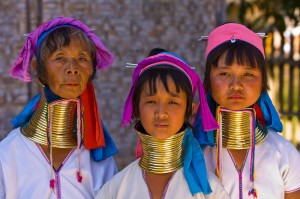Having lived in Viet Nam for over two years, I have had the privilege to visit remote villages throughout Southeast Asia, in Indonesia, Laos, Malaysia, Thailand and Burma. On more than a few occasions, I have taken part in eco-tours or homestays where local, indigenous people have been my guide, cook or instructor. My initial assumption has always been that tourism is mutually beneficial for both parties. I still believe that is true in most cases. However, I was disheartened after a tour of the local Kayan ladies in Burma.
The ladies seemed disconnected, despondent and dispirited as they performed a traditional dance for us. I felt as if I was encroaching on their home, their space, and their culture. It felt wrong.
I have done some further research into the impact of tourism on indigenous culture and found that, as I presumed, there are pros and cons. The following slideshow presentation goes through several case studies, which outline these threats and benefits. http://www.slideshare.net/guest809599/tourism-impacts-on-indigenous-people
Some negative impacts:
- Staged authenticity – the performing of shows as if it were in real-life (this is what I experiences in Burma)
- Cultural Erosion – cultural goods may be sold as souvenirs, possibly lessoning the spiritual or cultural importance
- Westernization: growing contact with outsiders can affect the culture’s religion, values, language and values.
Some positive impacts:
- Economic stability
- Western cultures learn to appreciate diversity
- Eco-tourism encourages locals to preserve the environment
Overall, this slideshow was a useful resource. It offered interesting case studies of indigenous people from Ecuador, Australia and East Africa. I do; however, feel that it is worth searching for other credible resources on this topic.


I’ve been thinking more about how flourishing tourism in indigenous communities relates to technology and education. They key to that question lies in the westernization that occurs because of contact with outsiders. Increased connectivity and technological advancement is almost inevitable because tourists demand a certain comfort and because the tour company can profit from online advertising. Education is impacted as well, because contact with tourists may shift their values and therefore change their educational goals.